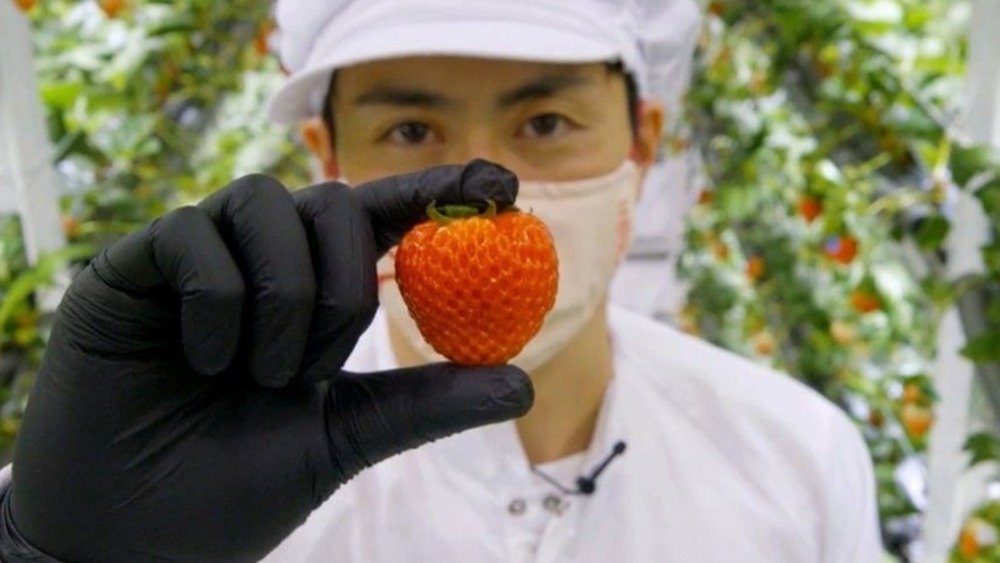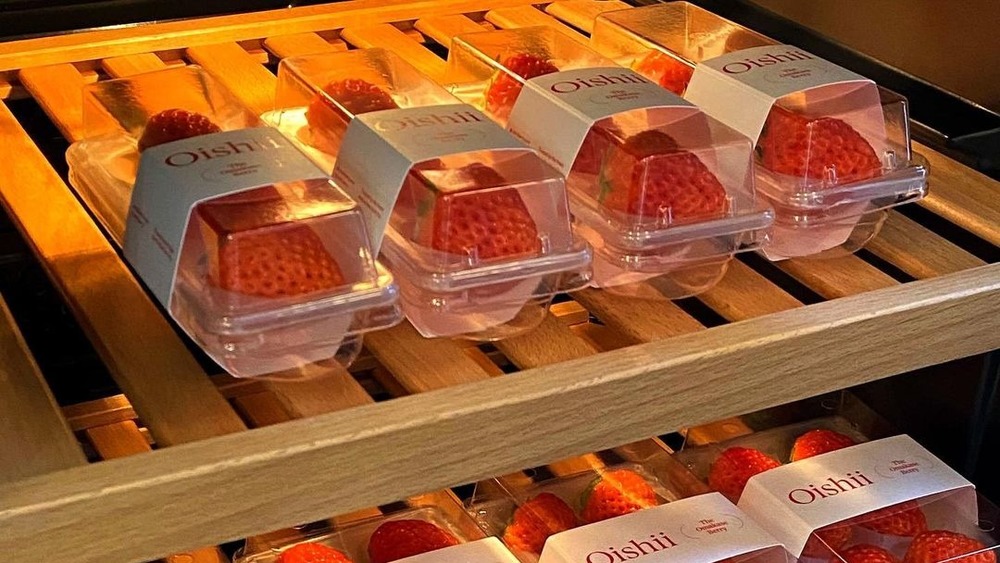Why The 'Tesla Of Strawberries' Cost $5 Each
Why does the "Tesla of strawberries" cost $5 each? "This is an oh my god berry," one Omakase berry enthusiast gushed in Oishii's promotional Instagram video. To give you a more precise idea: Oishii's strawberries, berries that the company's CEO, Hiroki Koga, calls the "Tesla of strawberries" or the "happiest strawberries that you can find on this planet," are sold in three-packs (via Food Navigator and Instagram). Oishii suggests you pair your first "with a sip of perfectly brewed Japanese Oolong Tea," your second with "a bite of creamy, bloomy rind cheese" and your third "with a glass of natural wine." The whole experience will cost you at least four McDonald's Happy Meals; be prepared to dish out between $15.00 and $18.75 for these strawberries (they retail, says Grub Street, at between $5.00 and $6.25 a pop, depending on size) in addition to your tea, cheese, and alcohol investment.
If you do buy an Omakase berry, you shouldn't wait to eat it. Oishii, Time reports, guarantees that upon purchase, their strawberries will have been harvested and delivered on the same day to ensure that each berry is perfectly, exquisitely ripe. The company's farmers are trained, intensively, to identify the optimum "shade of red" (via Instagram). "When you bite into it, the aroma just spreads into your mouth," Koga told NPR. "Our customers say when they leave a tray of our strawberry in their room, and they come back after two or three minutes, the entire room smells like strawberry."
The science behind the "happiest strawberries on the planet"
When Oishii's CEO moved to the United States and tasted strawberries here, he was crestfallen. "It almost reminded me of cucumbers," he told NPR. So Koga traveled back to Japan and taste-tested nearly 50 varieties of strawberries before he settled on the one he'd grow in his vertical farm in New Jersey, a 15-minute drive from New York City. The variety Koga painstakingly selected contains twice as much sugar as any-old-American-supermarket strawberry. Besides that, Oishi promises "an airier texture and unexposed seeds."
To achieve perfection, Koga relied on Japanese experts to simulate the weather conditions of a "perfect day in Japan." And he doesn't simply control temperature in his vertical farm, he also regulates "humidity and levels of CO2 and wind speed" (via NPR). Additionally, with the help of an AI machine, real, live bees pollinate the farm's strawberry flowers. Oishi claims that it's the first indoor vertical farm to achieve such natural pollination (via Instagram). The result, says Grub Street's Adam Platt, is a "diabolically uniform" berries, "you would call [them] monotonous, except they're really quite delicious."
For now, you'll only be able to try these strawberries with non-cucumber-like taste profiles if you have easy access to Manhattan. But a recent $50 million investment into Oishi may soon change that. Koga, according to Food Navigator, has already developed simpler-to-grow, cheaper, grocery-friendly strawberry varieties. He swears they have similar taste profiles to the original Omakase berry.

